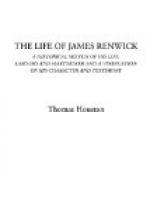works of Buchanan, Rutherford, and Gillespie, bear
ample testimony to the enlarged views of their authors
in relation to the proper bounds of civil and ecclesiastical
authority, and to their fidelity to the cause of genuine
liberty. The same great principles were contended
for by Alexander Henderson, embodied in the scriptural
attainments of the memorable Second Reformation, and
clearly enunciated in the Solemn League and Covenant
of the three kingdoms, in which the covenanters explicitly
bound themselves to support the king and parliament
in “the maintenance of the true reformed religion.”
When the Scottish nation, forgetful of their sacred
vows, tamely submitted to the tyranny of the royal
brothers, and Presbyterian ministers remained silent
under an infamous indulgence, it devolved upon a few
despised and persecuted covenanters,—the
Society people,—to lift up and hold aloft
the torch of freedom; and by their faithful testimonies
and declarations uttered in fields and on scaffolds,
and more still, by their blood freely shed to confirm
their righteous cause, to sow broadcast the principles
of genuine liberty. These, after lying buried
in the earth for a time, sprung up vigorously, and
bore fruit, when the perfidious race of the Stuarts
was driven ignominiously from the throne; and, at the
Revolution, some of the fundamental truths for which
the martyrs of the covenant contended, became ascendant
and triumphant.[3]
In the Queensferry Paper, penned by Cargill,
in a rough draft, and found on the person of Henry
Hall of Haughhead, when he was taken, the heroic sufferers
expressly disowned the authority of Charles II. and
his government. The terms employed, it has been
remarked, very much resemble those used by the English
nation when they rejected the Government of James
II., and transferred the crown to William and Mary.
“We reject the king and those associate with
him in government from being our king and rulers,
being no more bound to them. They have altered
and destroyed the Lord’s established religion,—overturned
the fundamental and established laws of the kingdom—taken
away altogether Christ’s church government,
and changed the civil government of this land, which
was by a king and free parliament, into tyranny.”
The conclusion expresses sentiments worthy of the
most distinguished patriots, and that are fit to be
taken as the watchward of struggling freemen all over
the world. “We bind and oblige ourselves
to defend ourselves and one another in our worshipping
of God, in our natural, civil and divine rights and
liberties, till we shall overcome, or send them down
under debate to posterity—that they may
begin where we end.”




